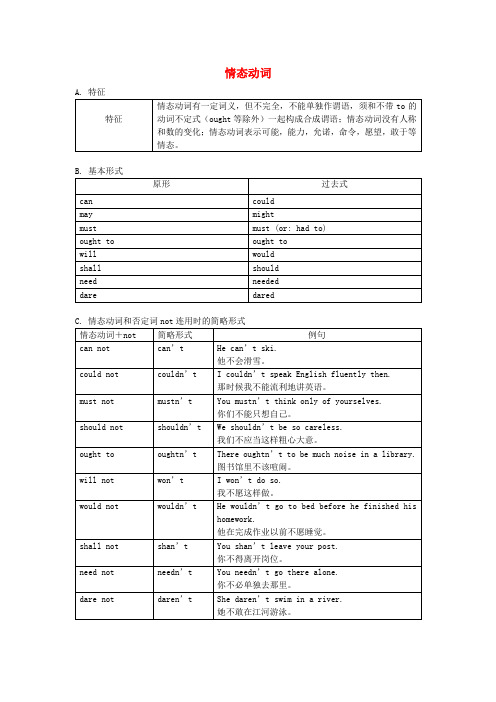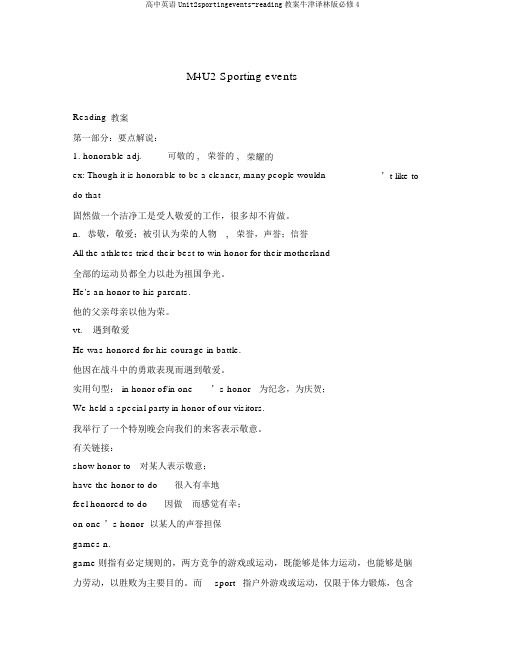高一英语译林版必修4学案:语法解读 Unit2 Sportingevents 含解析 精品
高中英语 Unit2 Sporting events语法讲解 牛津译林版必修4

情态动词C. 情态动词和否定词not连用时的简略形式D. 情态动词的用法语法专练一、单项选择1. You didn’t go to the party yesterday, or I _____ you.A. would seeB. could seeC. might have seenD. might see2. He _____ at the meeting this morning. He was in hospital then.A. can’t have spokenB. mustn’t have spokenC. shouldn’t have spokenD. needn’t have spoken3. He must be in the classroom, _____ he?A. can’tB. mustn’t heC. isn’tD. needn’t4. You _____ have brought your camera. They all had theirs with them.A. couldn’tB. needn’tC. wouldn’tD.mustn’t5. My little son _____ out alone at night.A. dares not goB. dares not to goC. dare not to goD. doesn’t dare to go6. At last he _____ finish the work ahead of time.A. couldB. was able toC. could be able toD. can be able to7. There must be some soldiers hidden in the forest. _____ any behind the church?A. Must there beB. Should there beC. May there beD. Can there be8. If anybody _____ to see me, say that I shall be back soon.A. would be comeB. comesC. cameD. should come9. —Could I have a word with you?—Yes, _____.A. you canB. you couldC. you mustD. you should10. I told him how to get here, but perhaps I _____ for him.A. had to draw a mapB. should have drawn a mapC. ought to draw a mapD. must have drawn a map11. She is late. What _____ have happened to her?A. shouldB. mustC. canD. would12. —We were waiting for you this time yesterday.—Sorry, I _____ you to tell you that I couldn’t come.A. must have calledB. would have been callingC. could have been callingD. should have called13. You _____ swim even faster than he if you practice more.A. mustB. canC. ought toD. have to14. I wonder why it’s so dark. There _____ be a heavy rain coming.A. shallB.mustC. shouldD. will15. They _____ not to make so much noise in the classroom.A. needB. dareC. canD. ought16. You _____ return the bike right now. You can keep it until he wants to use it.A. mustn’tB. may notC. can’tD. needn’t17. It’s fine and sunny outside. _____ we go out for a walk?A. MustB. WillC. WouldD. Shall18. The meeting has already begun. You _____ 10 minutes ago.A. should comeB. ought to comeC. must have comeD. ought to have come19. Little Franz wasted a lot of time playing when he _____.A. should studyB. must studyC. should have studiedD. must have studied20. If your group leader is not right, you _____him.A. mustn’t obeyB. don’t have to obeyC. wouldn’t have obeyedD. can’t have obeyedKey:1-5 CACBD 6-10 BDDAB 11-15 CDBBD 16-20DDDCB二、动词填空(用适当的情态动词填空)1. A: There were already five people in the car but they managed to take me as well. B: It _____ have been a comfortable journey.2. A: Jack, you _____ play with fire. You _____ hurt yourself.B: OK, mum.3. A: Will you stay for dinner?B: Sorry, I _____. My mother is waiting for me at home.4. A: My new pencil-box has disappeared.B: Who _____ have taken it?5. A: She looks very sad. You _____ have told her the bad news.B: But I didn’t mean to hurt her.6. A: _____ you succeed!B: Thanks a lot.7. A: A computer _____ think for itself.B: You are right. It _____ be told what to do.8. A: Shall I tell Mary about it?B: No, you _____. I have told her already.9. A: You _____ call him if you want to.B: I _____! He is sure to call me.10.A: I’m told Tom had another car accident this morning.B: I can’t believe it. He _____ have been so careless.Key: 1. couldn’t 2. mustn’t/shouldn’t, may/might/could 3. can’t 4. might/could5. shouldn’t6. May7. can’t, must8. needn’t9. can, needn’t 10. couldn’t三、句子翻译1. Michael should have come to school a little earlier in the morning.2. Barbara may/might have been ill last week.3. They should be here by now.4. He ought to know her telephone number.5. Shall I close the door?6. 这个女孩法语讲得很流利,她肯定在法国待过多年。
高中英语Unit2sportingevents-reading学案牛津译林版必修4

M4U2 Sporting eventsReading 教案第一部分:要点解说:1. honorable adj. 可敬的 , 荣誉的 , 荣耀的ex: Though it is honorable to be a cleaner, many people wouldn ’t like to do that固然做一个洁净工是受人敬爱的工作,很多却不肯做。
n.恭敬,敬爱;被引认为荣的人物,荣誉,声誉;信誉All the athletes tried their best to win honor for their motherland全部的运动员都全力以赴为祖国争光。
He's an honor to his parents.他的父亲母亲以他为荣。
vt.遇到敬爱He was honored for his courage in battle.他因在战斗中的勇敢表现而遇到敬爱。
实用句型: in honor of/in one’s honor为纪念,为庆贺;We held a special party in honor of our visitors.我举行了一个特别晚会向我们的来客表示敬意。
有关链接:show honor to对某人表示敬意;have the honor to do很入有幸地feel honored to do因做而感觉有幸;on one ’s honor以某人的声誉担保games n.game则指有必定规则的,两方竞争的游戏或运动,既能够是体力运动,也能够是脑力劳动,以胜败为主要目的。
而sport指户外游戏或运动,仅限于体力锻炼,包含娱乐性的及比赛性的;不以输赢为目的。
sports 和 games都表示“运动会”,但有大、小之分,如 school sports (校运会),the Asian Games(亚运会),the Olympic Games(奥运会)delight n.乐趣;愉悦;惊喜The children were made to laugh with delight孩子们被逗得快乐地大笑adj. delighted惊喜的,快乐的I was delighted to be invited to her party.我很快乐被邀请参加她的晚会。
高一英语译林版4学案:目标导引Unit2 Sportingevents含解析

Unit 2Sporting events一览众山小单元概要表一表二Offering advice 提供建议1. I advise that。
.我建议……2。
Don’t you think it would be.。
.你不认为……3.Why don’t。
..?为什么不……?4.Shall we..。
?我们将……?1。
掌握情态动词的概念和基本用法;2。
注意情态动词表示推测或判断的用法;3。
掌握情态动词在虚拟语气中的用法。
本单元要求写一篇演讲稿:1.最好选用有趣的主题以吸引听众;2。
写文章时要考虑到和听众的互动,建议使用:“Do you know/ How about。
.。
”等句型;3。
引用相关的内容可以增加文章的说服力。
奥运大家庭。
学习策略1.课文是一篇演讲稿,主要谈奥运会的历史及其意义,阅读课文之前先到图书馆、互联网等处查阅有关奥运会的信息,包括奥运项目的名称、奥运史上的著名人物等,以便课堂上能主动学习。
2.先带着22页上A部分的三个问题,快速浏览一遍课文,掌握其大意,通过完成24页C1和C2的练习,掌握文章细节。
3。
情态动词的重点是区分表示应该、推测、允许等意义时,各词所表示的程度和语气。
尤其注意区别使用can和be able to;shall 和will;mustn’t和needn’t;need和dare等词。
4。
阅读时,如何选取重要信息:1)阅读文章所给的问题,判断哪些题型可以依靠通读来解决。
比如概括文章主题,给无标题文章选标题,指出作者的思想观点、意图等题型就需要依靠通读来解决。
2)用较短的时间大体上浏览一下阅读材料,注意文章有可能涉及什么内容,属于什么体裁风格,以及文章安排的大体轮廓、重点分布等等。
3)从头到尾阅读一遍。
一般地说第一段或前几句包含着作者的基本思想和下文的发展线索,它们是全文展开的基础,为下文发展搭建了理论框架。
认真阅读第一段或文章的前几句,尽量抓住其中的主要情节和论点,把握全文发展的脉络。
2017--2018学年译林版必修四Unit 2 sports events grammar学案

Unit 2 sports events grammar学案情态动词一.情态动词的语法特征1. 情态动词不能单独作谓语,须和行为动词或连系动词一起构成谓语。
2. 情态动词没有人称,数的变化,但有现在时或过去时两种形式,其过去时也不一定表示过去,往往表示婉转的或不确定的语气。
3. 情态动词除ought 和have 外,后面只能接不带to 的不定式。
4. 情态动词没有非谓语形式,即没有不定式,分词等形式。
二.情态动词的基本用法1)表示能力,could主要指过去时间k①Two eyes can see more than one.②Could the girl read before she went to school?2) 表惊异、怀疑等态度。
主要用于否定句、疑问句或感叹句中。
①Where can (could) they have gone to?②②How can you be so careless?3)表示征求别人许可,相当于may①Can/Could I have a look at your new pen?②He asked whether he could take the book out of the reading-room.注意:could也可表示请求,表委婉,主要用于疑问句,不可用于肯定句,答语应用can。
4) 表示推测,“也许,可能”,can’t 表示“不可能”,绝对否定。
①Even a wise man can sometimes make mistakes.②There is no light in the room. Can she have gone to bed?③It can’t be true.④She can’t have gone to school---it’s Sunday.5) could/ couldn’t have done ◆本能够做而没能做//本不能够做而做了◆可能发生某事,实际上没有发生①I could have come earlier, but my car broke down half-way.◆You could have brokenyour leg.②Somebody must have opened the cage—the lion couldn’t have escaped on its own.◆用作猜测, 可能做了某事③Don’t worry—they could have just forgotten to phone.◆She could have gone off withsome friends.6)cannot too…to…;can never too…to再…也不为过; 越…越好cannot…enough再…也不够cannot do…but do… ; cannot…but do只能做①One cannot be too careful.②You cannot work too hard.③I cannot thank you enough.1)表允许,might语气更委婉。
高考英语牛津译林版必修4总复习教案《Unit 2 Sporting events(江苏专用)

Unit 2Sports events晨读在线假设你是李华,于2010年6月3日搭乘国外某航空公司航班(flight number BA793)回国后,发现遗失了一个行李箱(suitcase)。
现请用英文给该航空公司写一封信,请他们帮你寻找。
信件要点包括:○陈述写信原因○简要描述该行李箱○说明其重要性○期待回复并表示感谢注意:词数不少于120。
【范文欣赏】请进行完形填空(每空一词)Dear Sir,My name is Li Hua, and I took your flight (flight number BA793) 1.on June 3, 2010.I was quite satisfied with your service, 2.but when I arrived at the destination, I found my suitcase lost. 3.So I am writing the letter hoping to get your help to find my suitcase.My suitcase is a big black one with 4.a long handle.It is very important to me,5.because both my ID card and passport are in it.In addition, it also contains some confidential documents of my company.6.Once they are lost, it will cause great damage to my company.I will appreciate 7.it very much if you can help me out with this situation.I am looking forward 8.to your reply.Truly yours,Li Hua(129 words) 【名师点评】书信格式正确,行文规范,包含所有要点,符合请求信的特有要求。
牛津译林版高中英语必修4教案:Unit2SportseventsWord版含解析

Unit 2 Sports events□committee n. □Greece n. □wrestling n. □tradition n.□male n.& adj. □nation n. □contemporary adj. □wellknown adj.□boxer n. □medal n. □heavyweight n. □boxing n.□championship n. □flame n. □opening n. □excite vt.□hurdle n. □gymnastics n. □champion n. □final adj.& n.□joy n. □boundary n. □m ovement n. □nes t n.□torch n. □stadium n. □transport n.& vt. □citizen n.□vest n. □underwear n. □kettle n. □otherwise adv.□per prep. □grain n. □routine n.& adj. □toast n.& vt.□lemonade n. □pingpong n. □net n. □outdoors adv.□fre quent adj. □tech nique n. □bowling n. □continent n.□unusual adj. □rugby n. □golf n. □eagle n.□teammate n. □kangaroo n. □shot n. □referee n.□whistle n.& vi. □reporter n. □unfair adj.□bitter adj.□meanwhile adv.1.(2020·浙江卷)New power machinery and artificial fertilizers(化肥)have now totally transformed a way of life that started in the Stone Age.n.动力2.(2020·江苏卷)Humor also transports your mind away from your daily troubles.vt.使解脱出来3.(2019·全国卷Ⅱ) Handing out sliced oranges to bloodthirsty kids can be as exciting as watching your own kid score a goal.n.射门;进球得分4.(2018·浙江卷) Since then,this society has moved onward,never looking back,as the car transfor med America from a farmbased society into an industrial power.n.强国[单词拼写·运用]核心单词语境运用1.remove vt.去除,移开;开除;免除,解除(职务)2.tie vt.打成平局;(用绳、线)系,绑,捆用所给词的适当形式填空。
高一英语Module 4 Unit 2 Sporting events译林版知识精讲

高一英语Module 4 Unit 2 Sporting events译林版知识精讲【本讲教育信息】一. 教学内容:Module 4 Unit 2 Sporting events二. 教学目标:Unit 2 Grammar三. 教学过程:modal verbs(一)willI. 表现在经常发生的情况e.g. The man will go to work every day.= The man goes to work every day 后者更常用The door won’t open.=The door isn’t easy to open.II. 表示“决心”“意愿”“可能”等e.g. He’s full of faith and he will beat all his matches.If you will come tonight, he’ll meet you, I think.If he comes tonight, I will call you.This will be the book you are looking for.Will you come in ? (=Will you please come in?)(二)wouldI. 表示will 过去式e.g. He would take a walk after supper when he lived in the country.He said he would help.II. 表示“过去常常……”可以用used to,不过后者常常含有“现在不……”之意。
e.g. When young, he would go out for a trip on Sundays.When young, he used to go out for a trip.注意:would表示“过去常常……”时后面动词须是某种行为或动作,不能是静态动词。
高一英语译林版4学案:句型剖析Unit2 Sportingevents含解析

二、句型剖析1。
every four years(表示频率的句式)【典型例句】I go there every three days。
我每隔两天(每三天)到那儿去一趟。
He comes to see his uncle every third week。
他每隔两周(每三周)去看望一次他叔叔.He goes to town every other day (every two days).他每隔一天(每两天)去一次城里.He stopped and turned around every few meters.每走几米,他都要停下来转身(看看)。
【要点归纳】every 与数词或few,other 连用,表示时间或空间的间隔,其中几个主要结构如下:(1)every+基数词+复数名词,译为:每……(2)every+序数词+单数可数名词,译为:每……(3)every+other+单数可数名词,译为:每隔……(4)every+few+复数名词,译为:每隔几……单项选择(1)We have physics on Tuesday,Thursday and Saturday;that is,we have it ________。
A。
every other daysB.every three daysC。
every other dayD。
each two days解析:every other day意思是“每隔一天",与前面的陈述on Tuesday,Thursday and Saturday意思相符。
答案:C(2)He attended an evening class ________。
A。
each other dayB。
every other daysC。
each other daysD.every other day解析:从表达上来看,只有every other day正确,其他选项表达有误.答案:D2。
- 1、下载文档前请自行甄别文档内容的完整性,平台不提供额外的编辑、内容补充、找答案等附加服务。
- 2、"仅部分预览"的文档,不可在线预览部分如存在完整性等问题,可反馈申请退款(可完整预览的文档不适用该条件!)。
- 3、如文档侵犯您的权益,请联系客服反馈,我们会尽快为您处理(人工客服工作时间:9:00-18:30)。
三、语法解读常见情态动词的使用及其异同情态动词,在英文中主要用来表示说话人的看法、态度等,它很接近中文里的能愿动词。
从用法上来说,它有这样几个特点:(1)各个情态动词自身都有一定的词义。
(2)情态动词不能在句中独立担当谓语。
(3)情态动词在句中不受任何人称、性别、数变化的影响。
(4)情态动词后接的不定式都不带to,即接动词原形。
英文中的情态动词主要有can,could;may,might;must;ought to;need;dare,dared。
另外,shall,will,should,would在一定的场合也可用作情态动词。
例如:他会说五种语言。
现在她一定准时到家了。
我们应该为祖国而努力学习。
他们还有足够的时间,用不着这么慌张。
1.常用情态动词的基本用法(1)can,could 能,会could可以看作是can的过去式,这两个词除了时态不相同外,在表达意思的许多方面是相同的。
①表示脑力或体力上的能力谁也无法阻止科学的发展。
②表示客观上的可能性你可以从图书馆借到这本有用的书。
③表示主观上的允许Can我可以问你有关这件事的几个问题吗?④(用于否定句、疑问句或感叹句中)表示猜测、怀疑或惊诧你怎么会在这儿?她不可能蠢得去做那种事吧。
另外,could还常用于表示较客气委婉的看法、提问及用于虚拟语气的结构中。
您能稍微说慢一点儿吗?(2)may,might 或许,可能,可以might可以看作是may的过去式,这两个词除了时态不相同外,在表达意思的许多方面是相近的。
①可能性从明天起我可能会忙起来。
②表示允许At the press conference,a news reporter asked the chairman if she might trouble him with a question about Taiw在记者招待会上,一位新闻记者问大会主席她是否能提一个有关台湾方面的问题。
③may可用来表示祝愿,也常用于表示目的或让步的状语从句中:祝愿你比赛成功夺冠。
④might也常用于表示目的的状语从句中,或用于虚拟语气的结构中:They left off earlier on that day so that they might catch the first tr那天,他们为了赶上头班车动身早一些。
假若你将自己的时间利用得更好一些,你本可以学到更多东西的。
注意:在回答以may引导的问句时,一般说来避免使用may,以免显得太严厉或不太客气,而改用其他方式。
例如:—May I come in?我可以进来吗?—Yes,please/Sure./Certainly.请进。
(3) must 应该,必须,一定①表示出于职责、义务该做某事每个人都应该忠于自己的祖国。
②表示出于主观意识而必须要做某事你必须得快点儿,不然会迟到的。
在这种用法中must表示出于主观意识而必须要做某事;have to却表示由于某种客观原因而不得不做某事。
除此以外,have to自身有时态的变化形式。
例如:He has to be back home by他必须在五点钟前回家去幼儿园接他的儿子。
注意:在这种用法中,回答以must引导的问句时,若是否定答复,不可以用mustn’t 而需要用needn’t 或是don’t have to,因为mustn’t意思是“绝不能、一定不要”,而没有“不必”的意思。
例如:—Must we hand in our exercises today?我们今天必须交作业吗?—Yes,you must.是的,必须交。
—No,you needn’t (you don’t have to).不,不必今天交。
③表示禁止(用于否定句)You must not speak ill of others.你一定不要说别人的坏话。
④must表示猜测、推测,常用于肯定句。
对现在或未来的事进行猜测时,后接动词原形;对已经发生的事进行猜测时,后接have+过去分词。
例如:肯定是那个调皮的孩子在外面大叫。
(4)ought to应该①表示出于职责、义务该做某事你不应该在工作上如此粗心大意。
②表示极有可能发生某事如果我们马上出发,我们应当能够按时到达那里。
(5)need(用于否定句和疑问句)表示需要There are still one and a half hours to go,we needn’t b还有一个半小时,我们无需如此慌慌张张。
你需要这么早就去吗?(6)dare,dared(用于否定句、疑问句和疑问句)表示“敢你怎么敢对她说那件事?即使你敢做,我也不会让你做那件事,因为太危险了。
(7)shall 用作情态动词时,适用于第二人称和第三人称。
主要表示下面几层意思:①许诺仙女说:“你想得到什么,你就可以有什么。
②命令按告诉你的那么做。
③决心(表示某事一定会发生)这个法律于2008年元月1日生效。
④规定每个参赛者要佩戴一个数字标。
租赁者要保持房屋整洁有序。
用作情态动词时,有时表示具体的意思,有时却没有意义。
主要用于下面几个方面。
①表示出于职责、义务该做某事You should write to your parents at least once a m你应该至少每月给你父母亲写一封信。
②表示对某种情况的估计她不会这么一大早就出去了吧。
③表示惊讶、失望等情绪这件事竟然发生在我身上似乎太不公平了。
④用于某些从句中表示虚拟语气If it had not been for the doctor’s care the girl sho要不是大夫的精心照料,这个女孩现在就不能与你说话了。
(would可以看作是will的过去式,这两个词除了时态不相同外,在表达意思的许多方面是相近的。
当然will 和would又都有一些各自不同的独特用法。
)①用于第二人称疑问句,表示请求(在这种用法中would使语气更为客气、委婉)你需要帮助就告诉我,好吗?②用于表示愿望他们不得不遵从他们的意愿。
③表示习惯、倾向(可译成“总是会、老是”等)他总是在那儿一坐就是几个小时,什么都不干。
2.常用情态动词的用法比较(1)在表示“可能性”方面can,should,may,might这四个词都可以用来表示“可能性”,但在表达的语气和程度方面有所不同:can 和should表示以事实、理由为依据而存在的可能性;其中should的主观性较强,往往含有“应该会怎么样”的意思。
总体上说,这两个词在这方面的语气较强、较肯定。
与之相比,may 和might这两个词在这方面的语气较弱、没有那么肯定,表示主观臆断的可能性,没有足够的客观依据。
其中,might的语气更为委婉、更弱。
(2)在表示“猜测”方面在情态动词中can,should,may,might,must都可以用于表示“猜测”。
在五个情态动词中must的语气最为强烈,它是以事实为依据而进行的逻辑上的推理,因此它所指的动作发生的可能性最大。
can 和should表示以事实、理由为依据而进行猜测,它们所指的动作有发生的可能性,但语气没有must那么肯定。
其中should的主观性较强,往往表示说话人猜想“应该会怎么样”的意思。
may 和might这两个词在这方面的语气较弱、没有那么肯定,表示说话人根据自己的主观臆断而进行的猜测,一般地说没有足够的客观依据。
其中,might的语气更弱一些。
例如:As a football fan,he must have watched the football match on TV last night—Brazil vs France.(说话人料定自己的推测不会有错:哪有足球迷不看巴西队与法国队比赛的道理。
)作为一个足球迷,他昨晚肯定看了那场巴西对法国的比赛。
He can’t be out I just saw him a moment ago.(他不可能出去,因为我刚刚还见过他。
)他不可能出去,因为我刚才一会儿还见过他。
It’s 2:(现在两点半是上班时间,她应该在办公室。
)现在两点半,她应该在她的办公室。
(布朗或许一会儿回来,也许不回。
)布朗或许十分钟左右就会回来的。
(尽管她很聪明,但也许在学习语言方面会有困难。
)我认为,尽管她很聪明但也许在学习语言方面还是会有困难的。
单项选择(1)Michael ________A.needn’tC.should解析:从第二个分句“他太矮了”可以推知说话者持否定态度。
答案:(2)I told Sally how to get here,but perhaps I __________C.should解析:根据句意可知,说话者含有“后悔、遗憾”的意味,应使用“情态动词+完成式”形式,“should+完成式”才表示虚拟意义。
答案:(3)Jack __________D.ne解析:根据第二分句“否则的话他就会给我打电话了”可知“Jack肯定还没到”,用“can’t+完成式”。
答案:(4)Sir,you __________A.mustn’tC.won’t解析:从第二分句可知,这是妇女和儿童专用候车室,因此你“不准”坐在这儿。
mustn’t表示“禁止,不准”。
答案:(5)A left-luggage office is a place where bags __________ be left for a short time,especially at aA.shouldC.must解析:can在此表示许可。
答案:(6)——He should,but he _________A.mustB.canC.need解析:从后一句“他喜欢开车”可知说话者把握不大。
can not的语气太绝对,意思是“根本不可能”。
答案:(7)It has been announced that candidates __________ remain in their seats until all the papersA.canB.willC.may解析:shall用于第二、三人称,表说话人给对方的命令、警告、允诺、威胁等。
答案:(8)You can’t imagine that a well-behaved gentleman __________A.mightC.should解析:should在此表示惊讶的感情色彩,意思是“竟然”。
答案:(9)—Don’t for—_________A.I don’tC.I can’t解析:对祈使句的肯定回答用I will;否定回答用I won’t。
答案:(10)I didn’t see her in the meeting-room this morning.She _________B.解析:根据句意“我今天上午在会议室没见到她”,所以“她根本不可能在会上发言”。
